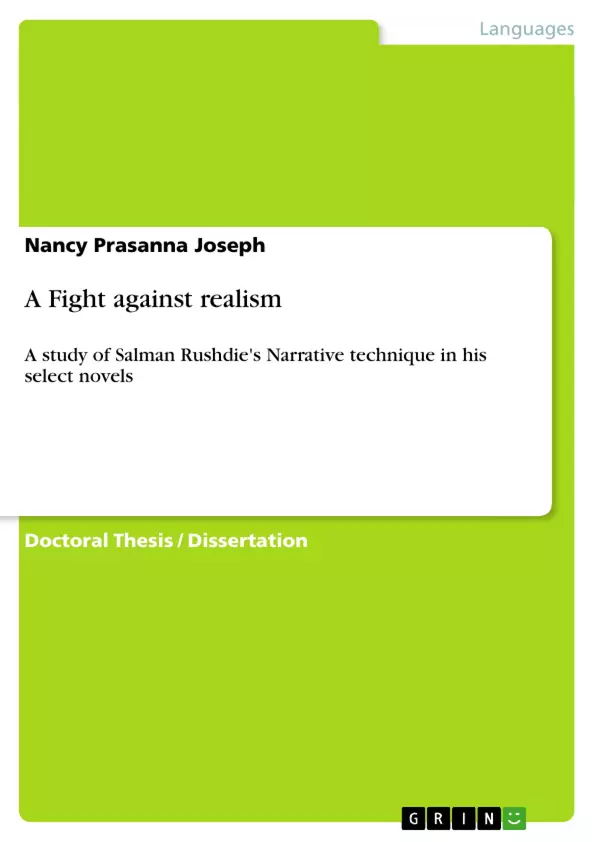
A Fight against realism
Doktorarbeit / Dissertation, 2005
110 Seiten, Note: A
Leseprobe
Inhaltsverzeichnis (Table of Contents)
- Chapter One Introduction
- Chapter Two - Salman Rushdie's Narrative Technique in Midnight's Children
- Chapter Three - Salman Rushdie's Narrative Technique in Shame
- Chapter Four - Salman Rushdie's Narrative Technique in The Moor's Last Sigh
Zielsetzung und Themenschwerpunkte (Objectives and Key Themes)
This work examines the narrative techniques employed by Salman Rushdie in three of his novels: Midnight's Children, Shame, and The Moor's Last Sigh. It analyzes how Rushdie blends myth, fantasy, and real-life experiences to create compelling narratives that explore themes of identity, history, and the complexities of postcolonial societies.
- Narrative Techniques of Salman Rushdie
- Exploration of Identity in Postcolonial Societies
- Blending of Myth and Reality in Literature
- The Influence of History on Narrative
- Cultural Hybridity and the Use of Language
Zusammenfassung der Kapitel (Chapter Summaries)
Chapter One: Introduction: This introductory chapter provides background information on Salman Rushdie and his literary career, highlighting his significant contributions to Indian writing in English. It introduces the concept of magical realism and its prominent role in Rushdie's work, drawing parallels to Gabriel Garcia Marquez.
Chapter Two: Salman Rushdie's Narrative Technique in Midnight's Children: This chapter delves into the narrative techniques employed in Midnight's Children, exploring how Rushdie uses magical realism to parallel India's history and the protagonist's life. It examines the novel's innovative use of language, blending English with native Indian languages.
Chapter Three: Salman Rushdie's Narrative Technique in Shame: This chapter analyzes the narrative techniques used in Shame, examining how Rushdie utilizes magical realism to portray political turmoil in Pakistan. It discusses the influence of modern literature on Rushdie's work and how it shapes his narrative style.
Chapter Four: Salman Rushdie's Narrative Technique in The Moor's Last Sigh: This chapter investigates the narrative techniques employed in The Moor's Last Sigh, focusing on how Rushdie explores commercial and cultural links between India and the Iberian Peninsula. It analyzes the novel's unique blend of history, fantasy, and contemporary social issues.
Schlüsselwörter (Keywords)
Salman Rushdie, magical realism, narrative techniques, postcolonial literature, Indian writing in English, identity, history, myth, fantasy, language, cultural hybridity, Midnight's Children, Shame, The Moor's Last Sigh.
Frequently Asked Questions
Who is Salman Rushdie?
Salman Rushdie is an Indian-born British author known for his narrative style that blends myth and fantasy with real life, often associated with magical realism.
What is the significance of the novel "Midnight's Children"?
It is considered a major milestone in Indian writing in English, serving as an allegory for the events in India after its independence in 1947.
What is magical realism in Rushdie's work?
Magical realism is a narrative technique where magical or fantastic elements are woven into a realistic setting to explore complex themes like identity and history.
Which three novels are primarily analyzed in this research?
The research focuses on "Midnight's Children", "Shame", and "The Moor's Last Sigh".
How does Rushdie use language in his novels?
Rushdie is known for cultural hybridity, often blending English with native Indian languages to reflect the tumultuous variety of the subcontinent.
What are the key themes of "The Moor's Last Sigh"?
The novel explores the commercial and cultural links between India and the Iberian Peninsula, blending history with contemporary social issues.
Details
- Titel
- A Fight against realism
- Untertitel
- A study of Salman Rushdie's Narrative technique in his select novels
- Veranstaltung
- English Literature
- Note
- A
- Autor
- Professor Nancy Prasanna Joseph (Autor:in)
- Erscheinungsjahr
- 2005
- Seiten
- 110
- Katalognummer
- V230567
- ISBN (eBook)
- 9783656484264
- ISBN (Buch)
- 9783656484370
- Dateigröße
- 1344 KB
- Sprache
- Englisch
- Anmerkungen
- A complete study of Salman Rushdie's Narrative technique in his select novels.
- Schlagworte
- fight salman rushdie narrative
- Produktsicherheit
- GRIN Publishing GmbH
- Preis (Ebook)
- US$ 38,99
- Preis (Book)
- US$ 50,99
- Arbeit zitieren
- Professor Nancy Prasanna Joseph (Autor:in), 2005, A Fight against realism, München, Page::Imprint:: GRINVerlagOHG, https://www.diplomarbeiten24.de/document/230567
- Autor werden
- Ihre Optionen
- Vertriebskanäle
- Premium Services
- Autorenprofil
- Textarten und Formate
- Services für Verlage, Hochschulen, Unternehmen

- © GRIN Publishing GmbH.
- Alle Inhalte urheberrechtlich geschützt. Kopieren und verbreiten untersagt.
- info@grin.com
- AGB
- Open Publishing
Der GRIN Verlag hat sich seit 1998 auf die Veröffentlichung akademischer eBooks und Bücher spezialisiert. Der GRIN Verlag steht damit als erstes Unternehmen für User Generated Quality Content. Die Verlagsseiten GRIN.com, Hausarbeiten.de und Diplomarbeiten24 bieten für Hochschullehrer, Absolventen und Studenten die ideale Plattform, wissenschaftliche Texte wie Hausarbeiten, Referate, Bachelorarbeiten, Masterarbeiten, Diplomarbeiten, Dissertationen und wissenschaftliche Aufsätze einem breiten Publikum zu präsentieren.
Kostenfreie Veröffentlichung: Hausarbeit, Bachelorarbeit, Diplomarbeit, Dissertation, Masterarbeit, Interpretation oder Referat jetzt veröffentlichen!
- GRIN Verlag GmbH
-
- Nymphenburger Str. 86
- 80636
- Munich, Deutschland
- +49 89-550559-0
- +49 89-550559-10
- info@grin.com
-









